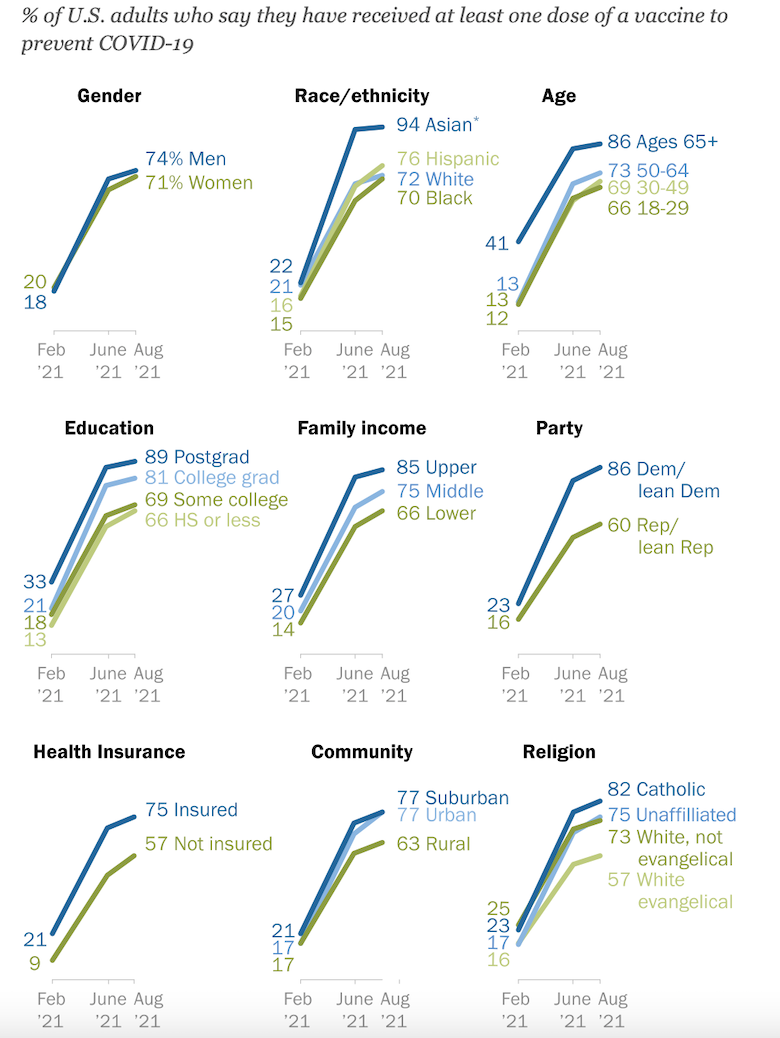Although the anti-vaccine and anti-mask protestors get a lot of media coverage, a new survey from the Pew Research Center finds that a majority of the American public (by a margin of 62% to 37%) see the health benefits if the Covid-19 restrictions as worth the costs, even though the restrictions have “hurt businesses and economic activity and keep people from living their lives the way they want”. But many also fear that the worst is yet to come.
The number of vaccinated has been steadily rising.
A new national survey by Pew Research Center, conducted from Aug. 23 to 29 among 10,348 U.S. adults, prior to President Joe Biden’s announcement of COVID-19 vaccine mandates for employers, finds that 73% of those ages 18 and older say they’ve received at least one dose of a vaccine for COVID-19, with the vast majority of this group saying they have received all the shots they need to be fully vaccinated. About a quarter of adults (26%) say they have not received a vaccine.
I found it encouraging that “A majority of Americans (61%) say changes to public health recommendations since the start of the outbreak have made sense because scientific knowledge is always being updated.”
Political partisanship is a big factor.
Partisan affiliation remains one of the widest differences in vaccination status: 86% of Democrats and independents who lean toward the Democratic Party have received at least one dose of a COVID-19 vaccine, compared with 60% of Republicans and Republican leaners.
…The intertwined dynamics of partisan affiliation and vaccination status are visible in views of policies to limit the spread of the coronavirus and vaccine requirements. Democrats offer broad support for most measures, while Republicans back select steps – like limiting international travel and requiring masks on public transportation – while opposing others and offering very little support for vaccine mandates. Similarly, vaccinated adults are far more supportive of policy steps aimed at limiting the spread of the coronavirus – and vaccine requirements – than are those who have not received a COVID-19 vaccine.
Interestingly, atheists are the most vaccinated.
Nine in 10 Americans identifying as an atheist report being at least been partially vaccinated against the virus, according to the survey of more than 10,000 adults conducted in late August. The number was higher than the 86% of Hispanic Catholics, and 82% of Catholics overall, who reported the same.
And it was notably more than Protestants, including 73% of white non-evangelicals, 70% of Black Protestants and just 57 percent of white evangelicals.
Among agnostics, the rate was 84%.
It is interesting that white evangelicals have the lowest vaccination rates. One suspects that this is correlated with political partisanship.


Wow, that 26 percentage point difference between Democrats and Republicans is stunning.
Well, I got my booster last Wednesday. Been feeling a bit under the weather, but much better this morning.
I got my Pfizer booster just one hour ago. I didn’t notice any side effects from either of the first two jabs, so I don’t expect anything bad this time, either. Or maybe I’ll have a little soreness at the injection site, like what I typically get from the flu shot, that hits me around bedtime. A small price to pay for (eventual) herd immunity (not the only reason, but a sufficient reason).
Never mind that the lack of restrictions would have hurt businesses and economic activity more, because people would be sick (including staff, not just customers) or dead.
Cost-benefit analysis, how does it work?
(Hard to live the life one wants in the ICU, unless of course one likes being incapacitated and at death’s door and utterly dependent on intensive care)